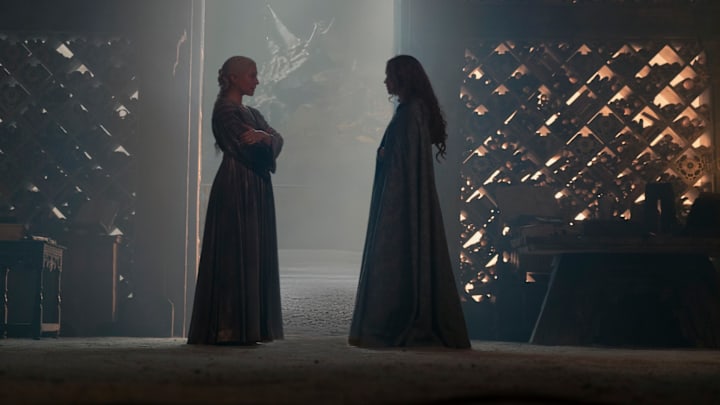The other week, author George R.R. Martin publicly criticized HBO's Game of Thrones prequel series House of the Dragon, which is based on his book Fire & Blood. He took particular issue with how the series is altering his source material, and warned of "more toxic" changes to come.
This produced a pretty awkward situation for HBO, which did some damage control in the days after. Game of Thrones, which is based on George R.R. Martin's A Song of Ice and Fire series, turned Martin into one of the most recognizable authors in the world; the network has a development deal with Martin, he's an executive producer on House of the Dragon, and his support lends credibility to the network's continued mission to expand its Game of Thrones universe. So to have the person who created that universe lambasting this very expensive spinoff in public is a bad look.
It's also curious, because Martin never once criticized Game of Thrones this stridently while it was running, despite that show running for eight seasons and changing a lot about Martin's books. So what makes House of the Dragon different? What is it doing that Game of Thrones didn't? Why is it worthy of public consternation when Game of Thrones wasn't? We can't know for sure without knowing Martin's mind (and we didn't ask him this in our exclusive interview), but we can make some educated guesses.

House of the Dragon changes the source material in ways Game of Thrones never did
To start, for a long time, Game of Thrones adapted Martin's Song of Ice and Fire books more or less accurately; what changes there were were mostly made for the sake of streamlining the story. So the Battle of the Blackwater goes down on TV pretty much how it happens on the page, although the show losing the flaming bridge of ships from Martin's book A Clash of Kings. The Red Wedding makes the jump from page to screen basically intact, with a couple of characters swapped in and out; for instance, in the book, Robb Stark's wife isn't present for the famous slaughter, whereas on the show she's massacred along with the rest of the Starks.
It isn't until the fifth season of Game of Thrones that the plot starts to wander away from the books to any significant degree. For instance, the fifth season sends Jaime Lannister to Dorne, the southernmost of the Seven Kingdoms, something that doesn't happen in the books. This is the show's attempt to fold a character we already know into a storyline from Martin's book A Feast for Crows, which introduces a lot of new players. The plotline isn't popular, but it's borne out of an earnest attempt to fit in as much of Martin's sprawling series into the TV show possible, and after it's over Jaime heads to the Riverlands to try and liberate the occupied castle of Riverrun, his actual plot from A Feast for Crows.
After season 5, Game of Thrones runs out of source material to adapt; Martin is still working on the next volume in the series, The Winds of Winter. The final three seasons of the show may resemble what Martin has in mind or they may not. But either way, it's hard to ding them for changing the source material when none existed at the time.

House of the Dragon, on the other hand, has started making big changes to the source material much earlier in its run. The first season stayed more or less accurate to the text of Fire & Blood, but the second has cut important characters, shifted the focus of the story and radically changed our understanding of major players.
I would not characterize the changes House of the Dragon has made as being for the purpose of streamlining the story from the book. Often, the show does the exact opposite of what Martin writes in the text. For instance, in Fire & Blood, Daemon Targaryen has very little trouble raising an army in the Riverlands, which is important to establish his credibility as a legitimate threat in this budding war. On House of the Dragon, he fails at everything he tries, leaving us wondering why we should take him seriously. In Fire & Blood, Rhaenyra Targaryen and Alicent Hightower are working against each other to make sure their chosen candidate sits the Iron Throne at the end of the war. On House of the Dragon, they work together to make sure Rhaenyra sits the Iron Throne.
These changes don't just fold and snip at the edges of the story to ensure it's digestible for TV audiences; they're changing the basic nature of the story Martin wrote, and I can understand why he'd be upset about this in a way he never was (at least not publicly) over Game of Thrones, which stayed faithful to the books for much longer and only deviated signicantly when it started to run out of source material. House of the Dragon, on the other hand, is leaping into uncharted territory even though it has a completed book to adapt. I don't blame Martin for thinking something needed to be done.
We don't know how or weather this public back-and-forth will be resolved, or if Martin's complaints will have an effect on the direction of House of the Dragon going forward. We likely won't find out until the show returns in 2026. Before then, a new Game of Thrones prequel show called A Knight of the Seven Kingdoms is on the way, and Martin is much higher on that one:
To stay up to date on everything fantasy, science fiction, and WiC, follow our all-encompassing Facebook page and Twitter account, sign up for our exclusive newsletter and check out our YouTube channel.
